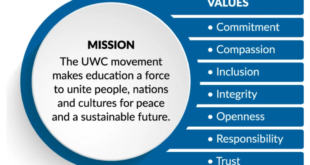We have had a great start to the year, getting to know 60 talented and enthusiastic new teachers from a diverse range of backgrounds, and introducing them to UWCSEA. The energy across the initial weeks has been palpable, and the challenge has been to balance the necessary induction (who we are, what we do and how we do things) with respecting and embracing diverse perspectives about how we might do things differently. We are acutely conscious of the danger of hiring for diversity and yet induct for conformity. We want to go beyond this; while we need new colleagues to know all about us (they need it too), we also want them to bring their ideas and experiences to us – we absolutely don’t want to indoctrinate.
Interestingly, the same issue applies with students. We are a College with a very strong identity that informs what we do on a daily basis. Specifically, we want to shape and develop our students towards our bedrock Mission of peace and a sustainable future. That’s not negotiable, and we also want them to think independently for themselves. That is, for them not just to adopt our purpose, but to see if and how the UWC mission can be made theirs and what it might looks like for them, across their lives. Education, not indoctrination. But what, precisely, is the difference?
 |
The question here is not a new one, nor is it a local one. It’s an old joke across the global UWC movement of 18 Schools and Colleges that people are so passionate about what they do, that ‘it’s more of a cult than a movement’ At one level, of course this is silly – cults are scary and dangerous places and we are far from that. But there is a deeper question here, about institutions, and how they shape the things we value, and the beliefs, convictions and aspirations that become part of everyone who spends time in them.
Sometimes you work at a company, or go to a College and it doesn’t really leave a mark on you. You get out of it what you came for, and you leave. I can think of places where I have worked or studied that have had no purchase on me, that were like casual acquaintances, easily forgotten. Others have stayed with me, and feel like family, even after many decades. Commentator David Brooks puts it this way: You always know when you meet a marine, a Juillard pianist, a NASA scientist .
These institutions have collective purpose, a shared sense of rituals, a common origin story. They nurture thick relationships and they demand full commitment. They don’t just educate; they transform.
I think that’s the right way to capture the dilemma I posed above. In some organisations, people are there to serve their individual self-interests, draw a salary, get a qualification. Other organisations offer a surrender to a shared cause, and provide a route to choosing to grow into a different person. That’s what we aspire to offer to any adult or child who joins us; the chance to be called forth in the service of something bigger than ourselves. With all the issues facing the world, there are plenty of causes to join.
So however determined and passionate anyone may be, it’s certainly not indoctrination if we can support individuals to find their answers to the sort of questions that support a meaningful contribution to the world beyond to the self.
- What kind of person am I now?
- What kind of person do I wish to become?
- What do I need to do during my lifetime so my life has a purpose?
- What does a successful life mean to me?
- Which of my strengths or values do I want to define me in the future?
These are the questions we seek to pose to students and staff over their time with us. And their answers will be their own; that’s the kind of education we want to offer.

